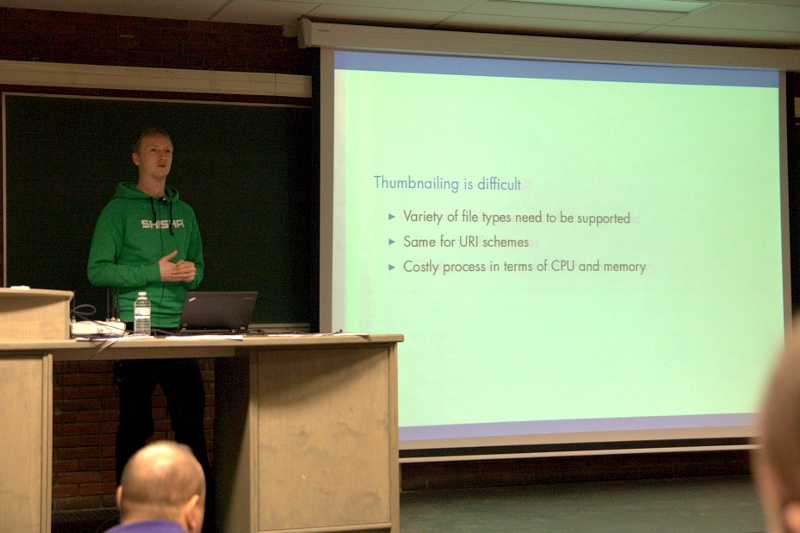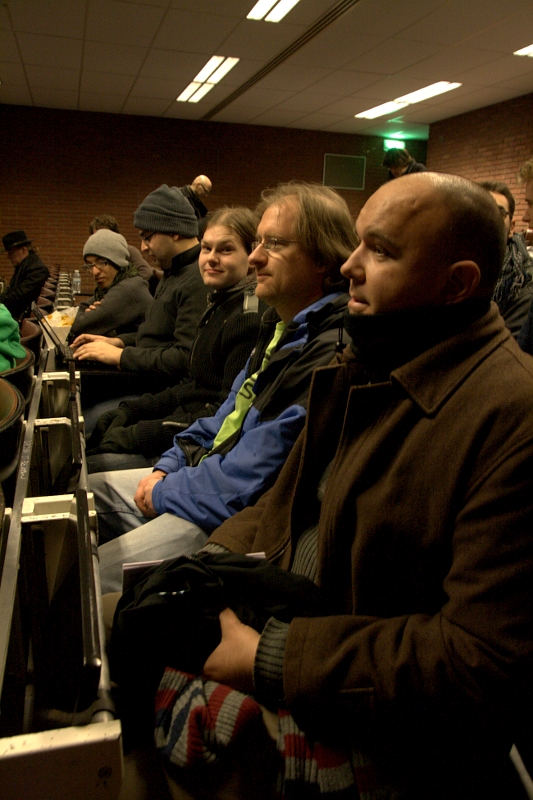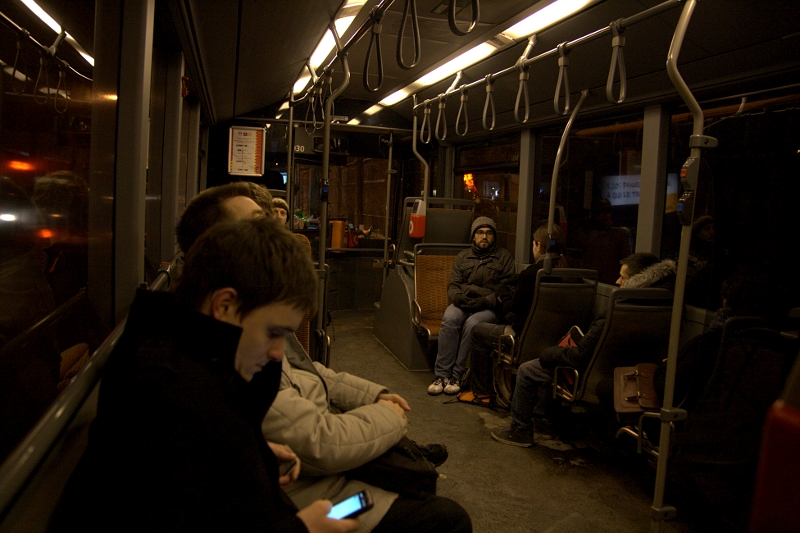How to start contributing to Xfce or any other open source project
It’s been a while since I’ve updated this website and even longer since I’ve written anything useful. But since I’ve received a couple of mails from people looking to contribute to Xfce recently, I thought I’d share some “wisdom” acquired over the past few years while working on Xfce and doing a lot of community work. My thoughts are not limited to Xfce and will apply to a lot of other projects out there as well.
Here’s the bitter truth for those looking for some quick pointers to start contributing to Xfce: you’ll have to find out yourself.
The reason is not that we are lazy or wouldn’t welcome your contributions. In fact, the reason, I believe, is very simple: you will be more excited, motivated and, ultimate, be more successful if you work on something that interests you. We can help you in making the decision what to invest your time in easier, e.g. by listing projects, features or issues that we or our users consider worth working on. Some projects do this very visibly (e.g. through bounties). In Xfce, this information is hidden in the depths of the wiki. Here are a few links that you may find interesting:
- Design SIG - working on improving the user experience of Xfce
- Component wish list - populated by our users
- Panel plugin wish list - populated by our users
Clearly, the above information could be more visible. There could be a prominent link on the Xfce website to a well-maintained and up-to-date list. Would that help people? Maybe.
Perhaps it is a good thing that the information isn’t just one click away. Open source projects have always been about scratching your own itch. This is how I got involved in everything I’ve done over the years. this approach is reflected by what people do and sometimes even by how companies make money. Thinking about it now, it is a concept deeply rooted in the evolution of mankind (think: the invention and improvement of tools, industrialisation and all that shit).
So: scratch your own itch.
If you want to start contributing to a project, try this exercise:
- Look at the project, think about what you don’t like or what you feel could be improved
- Try to collect information on what pieces are involved in e.g. the feature you’re missing or the bug you’ve spotted
- Try to find the place where you could try adding your feature or fixing your bug
- Ask whether developers are interested in the feature or look at whether there already is an item for your issue in the bug tracker
- The rest is communication and coding
It’s not a fast path because you might not be able to contribute something of great value in the beginning. But if you’re dedicated, have enough spare time to make a difference and are keen on improving things step by step, you might eventually reach a point where you take over responsibility for more and more exciting or important tasks.
Good luck!
FOSDEM 2012
This year’s FOSDEM is over and I hope that most of us have by now recovered from an exhausting weekend that was first and foremost exciting and a lot of fun! With about 12 people, the Xfce group was—I think—larger than ever before. Add to that a fairly large number of my colleagues from Codethink, into which I bumped at the beer event and FOSDEM itself from time to time. Despite mostly staying with Xfce, I enjoyed knowing and meeting people all over the place.
Unfortunately, some of us—myself included—missed half of the beer event because our trains and planes arrived late. Snow in Brussels, a cold weekend ahead. When we arrived at the Delirium Café at around midnight, I was glad to see that all the others had already made friends again. Olivier, Stephan, Peter, Nick, Simon, Christoph, everyone was there, some of them sufficiently drunk, I imagine. Although to be be fair, you wouldn’t really notice. Most of us left not to long after that in order to be in a good condition in the morning. Having only caught up half on drinking, Christian, Mike and I ended up staying at the Delirium with a few Codethink colleagues including Sam, Luc and Javier—until they finally kicked us out at around four in the morning.
Food, taxi, 2 1/2 hours of sleep later and we were sitting in the hotel, enjoying a fantastic buffet breakfast. Admittedly, I couldn’t eat that morning, ending the night in the Delirium had lead to quite a strong hangover. After the majority of us had gathered in the hotel lobby, we squeezed ourselves into the 71 bus in two groups and finally arrived at FOSDEM. I do not remember the details of the day, but it was a great mix of talks (including my own one about Tumbler, which I felt was not very special, picture below), chatting and minor hacking (at least on my side; Nick made good progress with the settings editor in the meantime). During the day, Jean-Francois, Jens and Mark joined us and we (or most of us at least) ended the day having food in a Vietnamese restaurant close to the hotel and a beer in the hotel lobby.



Sunday was similar, except that I could finally enjoy the breakfast. Lovely. Unfortunately, we didn’t manage to get everyone together anymore, so our initially large group was now split up into smaller ones for the rest of Sunday. We still managed to have a few technical chats about Xfce that day and made a few decisions (see below). Regards talks, I mostly remember the Wayland Q&A session and a talk about social engineering in free software communities, Most of us left in the afternoon or evening. I met up with Luc, Sam, Javier and a bunch of other people to have food in a very nice restaurant. Got up at six in the morning, walked to the central station, took a plane home from the airport and went back to work in the afternoon. Unlike a few others I seem to have escaped the typical illnesses (cold, broken sleep cycles, general exhaustion) that events like FOSDEM always bring along.
Xfce-Related News — Fresh from FOSDEM
Wayland was big this year. I will spare you the details of how it works. Throughout the weekend, we had various discussions that involved Wayland. While it may take some load of Olivier by eventually making window managers obsolete, there is still a major problem with it: it does not support the XEmbed protocol, and therefor will break pluggable settings dialogs and panel plugins. We have sent mails to the wayland-devel list to find out how they feel about this. For now, I suppose this is all we can do.
Reorganization of the settings dialogs
One thing we decided on Sunday was to reorganize the settings dialogs so that the location of particular types of settings becomes more predictable. This applies to appearance and window manager themeing, and the application keyboard shortcuts and window manager keyboard shortcuts in particular. We will rearrange some of these tabs and merge them so that all related settings are in one place. We will also merge the window manager and window manager tweaks dialogs into one.
Release Schedule for Xfce 4.10
Despite a lack of completed features in Thunar (which are unlikely to get finished before 4.10), there are only a few things that really keep us from releasing Xfce 4.10. We have not decided on a release date, but if things go well, we should be able to roll the first pre-release one month from now, in early March. This would mean that a final release in May or June would be feasible.
Possibility of a hackfest
Meeting up with the team is always great fun. Unfortunately, FOSDEM is a busy event and only lasts two days. Like last year, we discussed the possibility of an Xfce hackfest in the future. I would love to see this idea becoming reality. If half a dozen of the relevant people can make it for at least a couple of days, this could greatly benefit the development of Xfce. Ideally, such a hackfest would span over at least 4-5 days, ideally including a weekend to make it easier to attend for people with jobs. Given a relatively small group, it might even be possible to hold an event like this at someone’s flat. This is definitely something that we will look into soon.
Like every year, FOSDEM 2012 was a great event. And like every year, a few more nicknames have turned into real faces that, unsurprisingly, belong to incredibly friendly human beings! I only wish that we had more time to discuss things face to face and do some serious work on Xfce together. In any case, this calls for another iteration next year. And with that, I shall end this wrap-up.
Looking for a full time job in Open Source
Two years ago I was really close to canceling my studies and looking for a job instead. In the end I continued studying, passed the final exams of my Diplom (the German old-school equivalent to a Master’s degree) with excellent results and started working on my graduate thesis. Today, I am 1 1/2 months away from the submission deadline and it is clear that I will make it.
So, this time I’m serious: I’m looking for a full time employment in Open Source software development, engineering or management starting November this year. Hiring me will get you an experienced and talented hacker with a natural intuition for software architecture and aesthetics as well as a scientific and painstaking approach to software planning and implementation.
Through my work at the university and within the Xfce and Lunar Linux projects, I have gained experience in/with
- many programming languages (including C, C++, Ruby, Python, Vala, Lua, XSLT, TeX, Java, Bash and a couple of others),
- many frameworks (the whole GTK+/GLib stack including D-Bus, a bit of Clutter, XLib and Qt/QML, SWT/JFace, the FOX toolkit as well as web frameworks like Sinatra and Rails; some knowledge about the Linux kernel, its facilities and kernel-userspace communication mechanisms included),
- many developer tools (GNU compilers, Autotools, VIM, NetBeans, Eclipse and others),
- many software versioning systems (Git, Subversion, CVS and Mercurial), and
- various areas of computer science and software engineering (complexity theory, signal processing, graph drawing, micro-controller programming and sensor-based networking, software planning, testing etc.).
I feel equally at home developing for the desktop or for the web. Granted, my main area of expertise is user interface and middleware development on Linux, which my fellow Xfce hackers and I have successfully participated in, but I’ve always found web development with Ruby to be a refreshing change.
There are many other things related to open source that I love doing. Over the past years I’ve enjoyed being able to improve the transparency of the development and release management of Xfce. Streamlining the release process and providing tools for making release management fun was an initiative I am particularly proud of. The same goes for community efforts like the Xfce Foundation, which we’ve launched in early 2011 and which I am currently heading as president.
This post is not just about the past though, it’s also about what lies ahead. Things I am particularly interested in with regards to the future include
- mobile platforms and applications (iOS and Android are not good enough, I think we need open alternatives),
- multi-touch interfaces on Linux (yep, this is on the way, but there still is a lot of potential work to be done, I guess),
- cloud-based applications (I know I can store files and data on the web, but where are the mind-blowing features that go beyond availability of personal data everywhere?), and
- environmental and power saving applications (living responsibly will become important soon enough; how can we generate awareness and support environmental causes with the help of software?).
I am excited and curious what my role will be in all this. Anway, I guess this is enough information about me for now. After all, this is no biography but a job-search post. ;)
If you read this and you happen to be Microsoft or Apple, do not even bother to send a headhunter. I prefer to work in the open and I believe in Open Source for many reasons. This ecosystem that we’ve created over the past two decades provides a great way for people from all around the world to collaborate on projects they care about, in an honest and tolerant way. I think that’s an inspirational model from which our entire society can and hopefully will benefit. Why would we want to have it any other way?
If you are a member or leader of a company dedicated to Open Source software and are interested in hiring me, please let me know. Linked below are my resumé, software projects and email address. I’m looking forward to talking to you!
Download my resumé/CV — A list of references is included. Feel free to contact them; they are aware of being listed and I’m sure they will be happy to answer any of your questions.
My software projects — A list of open source software projects I am or have been working on.
Email address: jannis@xfce.org
Attending FOSDEM 2011
Today Nick and I booked hotel rooms for FOSDEM so now it’s official that the two of us will be there. I’m very much looking forward to it and I’m hoping to meet some of you at the FOSDEM Beer Event on Friday! Still need to think about a way to make ourselves recognizable as Xfce folks though.
If you are planning to attend and would like to meet any of the Xfce folks, please add your name in the wiki:
http://wiki.xfce.org/events/2011/fosdem
We haven’t decided where and when to meet on Saturday and Sunday but I’m sure we will find something. Stay tuned for additional announcements on this weblog.
In addition to celebrating the 4.8 release of Xfce which is scheduled for next weekend, one of our goals for FOSDEM 2011 will be to sign the papers for registering the Xfce Foundation e.V. in Germany. The details of this still need to be worked out, however. I’ll keep you posted about this as well.
If you would like to talk to me about things other than Xfce, please drop me a mail and I’m sure we can arrange something.